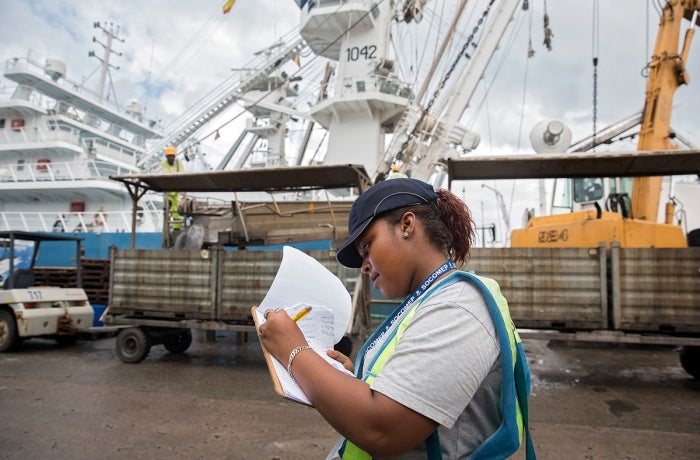Facts and figures: Economic empowerment

Explore key data and facts on the economic empowerment of women. From income disparities and workforce trends to entrepreneurship and access to financial resources, these statistics spotlight the critical role of economic empowerment in advancing gender equality and driving sustainable development.
Benefits of women’s economic empowerment
- Women’s economic empowerment is essential to achieving women’s rights and gender equality. Women’s economic empowerment means ensuring women can equally participate in and benefit from decent work and social protection; access markets and have control over resources, their own time, lives, and bodies; and increased voice, agency, and meaningful participation in economic decision-making at all levels from the household to international institutions.
- Promoting women’s economic justice and rights in the economy and closing gender gaps in the world of work are key to achieving the 2030 Agenda for Sustainable Development and achieving the Sustainable Development Goals [1].
- When more women work, economies grow. Women’s economic empowerment increases economic diversification and income equality for shared prosperity [2]. It is estimated that closing the gender gap could give the global economy a USD 7 trillion boost [3].
- Increasing women’s and girls’ educational attainment contributes to women’s economic empowerment and more inclusive, environmentally sustainable economic growth. Education, upskilling, and re-skilling—especially to keep pace with rapid technological transformations affecting jobs—are critical for women’s and girls’ health and wellbeing, as well as their income-generation opportunities and participation in the formal labour market.
- Women’s economic equality is good for business. Companies greatly benefit from increasing employment and leadership opportunities for women, which is shown to increase organizational effectiveness and growth. It is estimated that companies with three or more women in senior management functions score higher in all dimensions of organizational performance [4].
Current overview of women's economic empowerment
- One in every 10 women is living in extreme poverty (10.3 per cent). If current trends continue, by 2030, an estimated 8 per cent of the world’s female population – 342.4 million women and girls – will still be living on less than $2.15 a day. Most (220.9 million) will reside in sub-Saharan Africa [5].
- Women are less likely to have access to social protection. Gender inequalities in employment and job quality result in gaps in access to social protection acquired through employment, such as pensions, unemployment benefits, or maternity protection. Coverage of women lags behind men by 8 per cent (34.3 per cent and 26.5 per cent, respectively). Globally, an estimated 73.5 per cent of women in wage employment do not have access to social protection [6].
- Women are more food insecure than men. Gender gaps in food insecurity have grown from 1.7 per cent in 2019 to more than 4 per cent in 2021, with 31.9 per cent of women moderately or severely food insecure compared to 27.6 per cent of men. This is even more acute for older and indigenous women, women of African descent, gender-diverse persons, persons with disabilities, and those living in rural and remote areas [7].
- Women and girls suffer most from the dearth of safely managed water and sanitation. Women and girls are responsible for water collection in 70 per cent of households without access to water on premises. Menstrual hygiene management is difficult in the absence of water, soap, and gender-responsive sanitation facilities, whether at home, school, or work [8].
- Women are less likely than men to have access to financial institutions or have a bank account. The gender gap in bank account ownership has dropped in 2021 after years of stagnation, although rates vary across economies. In developing economies, the gender gap stands at 6 per cent per cent while globally it sits at 4 per cent with 78 per cent of men reporting having an account at a formal financial institution compared to 74 per cent of women [9].
- The digital divide remains a gendered one with 37 per cent of women globally not using the internet, meaning 259 million fewer women have access to the internet than men [10].
Women and the world of work
- Gender differences in laws affect both developing and developed economies, and women in all regions. Globally, over 2.7 billion women are legally restricted from having the same choice of jobs as men. Of 190 economies assessed in 2023, more than one-third (69 economies) have laws constraining women’s decision to work, and 43 economies have no laws on sexual harassment in the workplace [11].
- Women remain less likely to participate in the labour market than men around the world. Globally, the gender gap in labour force participation has hovered at 30 per cent since 1990, with men’s participation at around 80 per cent and women’s at 50 per cent. Labour force participation rates for women aged 25-54 in 2022 was 61.4 per cent compared to 90.6 per cent for men. Women in the same age group with at least one child under six experience a “motherhood penalty” as the gap widens from 29.2 per cent to 42.6 per cent, with female participation at 53.1 per cent and male participation at 95.7 per cent [12].
- Women are slightly more likely to be unemployed than men but experience a much larger jobs gap. In 2022, global unemployment rates for women and men stood at 5.7 per cent and 5.8 per cent respectively. This is projected to remain relatively unchanged in 2024. In 2022, the jobs gap rate for women was 15 per cent compared with 10.5 per cent for men, meaning an additional 153 million women have unmet need for employment compared with 115 million men [13].
- Women are over-represented in informal and vulnerable employment. Nearly 60 per cent of women’s employment globally is in the informal economy, and in low-income countries, it is more than 90 per cent, according to the latest research from 2018 [14].
- In the agricultural sector, women are overrepresented in seasonal, informal, part-time, and low-wage work with limited access to social protection [15]. Globally, 36 percent of working women compared to 38 percent of working men work in agrifood systems as of 2019, but this may exclude self-employed and unpaid family workers. Differences across countries and regions are striking. In sub-Saharan Africa, 66 per cent of women’s employment is in agrifood systems, compared with 60 per cent of men’s employment while in southern Asia, 71 per cent of women workers are engaged in agrifood systems, compared with 47 per cent of men workers [16].
- Women farmers have significantly less access to, control over, and ownership of land and other productive assets compared to their male counterparts. For example, less than 15 per cent of agricultural landholders globally are women, although this varies widely across countries. Closing the gender gap in farm productivity and the wage gap in agrifood-system employment could increase global gross domestic product by 1 per cent – that’s nearly USD 1 trillion [17].
- Women are paid less than men. The gender wage gap is estimated to be 20 per cent. This means that women earn 80 per cent of what men earn, though these figures understate the real extent of gender pay gaps, particularly in developing countries where informal self-employment is prevalent [18]. Women also face the motherhood wage penalty, which increases as the number of children a woman has increases [19].
- Women are less likely to be entrepreneurs and face more disadvantages starting businesses. In 2022 women’s start-up activity in 2022 was 10.1 per cent, or 80 per cent of the rate of men at 12.6 per cent. However, the established business rate for women was 5.5 per cent, or 68 per cent of the rate of men at 8.1 per cent. This means that the gender gap is greater later in the entrepreneurship cycle, demonstrating women face many barriers not only starting a business but also maintaining it due to the inequality they face [20].
- High rates of entrepreneurship are often observed among women in lower- and middle-income countries where decent job options are scarce, underscoring the important linkages between employment and entrepreneurship [21].
- Violence and harassment in the world of work affect women regardless of age, location, income, or social status. The economic costs to the global economy of discriminatory social institutions and violence against women is estimated to be approximately USD 6 trillion annually [22].
Care work (unpaid and paid work)
- Unpaid care work is essential to the functioning of the economy but often goes uncounted and unrecognized [23].
- Women shoulder a disproportionate share of unpaid care and domestic work. Globally, women—particularly those from low-income, migrant, and racialized groups—perform more than three-quarters of unpaid care and domestic work [24].
- By 2050 women globally will still be spending almost 2.5 more hours per day on unpaid care work than men, on the current trajectory [25].
- If women’s unpaid work were assigned a monetary value, it would exceed up to 40 per cent of GDP in some countries based on conservative estimates [26].
- Women constitute the majority of paid care workers, including in health, education, and paid domestic work. Despite being essential, this paid care work is underpaid, considered unskilled, and often insecure [27]. An estimated 80 per cent of domestic workers worldwide are women, with 90 per cent not having access to social security and more than half with no limits on their weekly working hours [28].
- Closing existing care policy gaps and expanding care services with decent care work could create almost 300 million jobs by 2035, which would contribute to reducing gender inequalities in employment and yield significant economic and social returns [29].
- Around 70 to 90 per cent of jobs created by investing in care infrastructure will benefit women [30].
- Studies show that investment in the care sector could create almost three times as many jobs as the same investment in construction and produce 30 per cent less greenhouse gas emissions [31].
Climate change and the environment
- Environmental degradation and climate change have disproportionate impacts on women and children. Women often bear the brunt of coping with climate-related shocks and the health effects of indoor and urban pollution, which add to their time spent caring for people and the planet. As land, forest, and water resources are increasingly compromised, privatized, or “grabbed” for commercial investment, local communities, and indigenous peoples, particularly women, whose livelihoods depend on them, are marginalized and displaced.
- More than 1.2 billion jobs, or 40 per cent of the global labour force, that are directly or heavily dependent on the environment and ecosystems are at serious risk [32].
- Women will be severely at risk of job losses due to their high participation in sectors prone to climate change impacts, such as agriculture [33].
- Climate change could push up to 158.3 million more women and girls into poverty by 2050 (16 million more than the total number of men and boys) under a worst-case climate scenario. Food insecurity is projected to affect as many as 236 million more women and girls than today, compared to 131 million more men and boys [34].
- As countries pursue a just transition, 24 million new jobs could be created worldwide by 2030 [35].
- But more than 80 per cent of the new jobs created, primarily through the phaseout of coal mining and coal-fired power, will be in sectors currently dominated by men. Only 20 per cent of these new jobs will be created in sectors where women are the majority [36].
- Globally, women are 14 times more likely than men to die during a disaster [37].
Sustainable energy
- Sustainable, clean, and affordable energy can accelerate gender equality, poverty alleviation, and social norms transformation, but many women remain without it. By 2030, an estimated 341 million women and girls will still lack electricity, if current trends continue; 85 per cent will reside in sub-Saharan Africa [38].
- Universal access to electricity could help end poverty for 185 million women by 2050 [39].
- Access to clean cooking fuels and technology also remains out of reach for many women. By 2030, coverage is projected to be only 23 per cent in sub-Saharan Africa and 17 per cent in Oceania (excluding Australia and New Zealand) [40].
- By 2050, the transition to modern cookstoves could result in 6.5 million fewer deaths from indoor air pollution [[41].
- Women and girls are more likely to carry the burden of energy poverty and experience the adverse effects of a lack of safe, reliable, affordable, and clean energy. Indoor air pollution from using combustible fuels for household energy caused 3.2 million deaths in 2020, an issue that disproportionately affects women and children [42].
Women migrant workers
- It is estimated that women represent 48 per cent of the 281 million international migrants. Women who migrate as workers face various challenges, including potential gender discrimination in the job market and a lack of support networks in a foreign country. Many women migrate as family members rather than solely for employment opportunities. These factors can lead to fewer women being represented among migrant workers [43].
- Women migrant workers remit substantial portions of their earnings, sending as much or even more than men, despite limited disaggregated data on remittances, gender inequalities in the labour market, and gender wage gaps globally [44].
- Women migrant workers are more likely than men to remit regularly owing to women’s stronger links to family members and self-insurance motives to financially protect themselves and their families [45], underlining the link between a woman’s caregiving role in the household and her increasing propensity to remit [46].
- Women migrant workers populate informal, low paid, and unregulated work. As of 2021, the main sectors in which women migrant workers are employed are: services (79.9 per cent), industry (14.2 per cent), and agriculture (5.9 per cent). More women migrant workers than men work in service-related jobs, often owing to an increasing demand for workers in the care industry, such as healthcare and domestic work [47].
- Of the more than 67 million domestic workers over the age of 15, 80 per cent are women and one in five is a migrant worker [48].
Financing for gender equality
- In 2021-2022, 43 per cent of bilateral allocable Official Development Aid (ODA)—which is aid that is paid directly from official government sources to recipient countries—had gender equality as a policy objective (USD 64.1 billion), down from 45% in 2019-2020.
- Of this aid, only 4 per cent was dedicated to programmes with gender equality as the principal objective, a similar share from the previous period.
- In 2020, an OECD survey looked at blended finance funds and facilities. These funds use development finance strategically to attract more money for sustainable development in developing countries. The survey found that only 1 per cent of these assets under management was allocated to gender equality and women’s empowerment as the main objective [49].
Notes
[1] UN Secretary General’s High Level Panel on Women’s Economic Empowerment, Leave No One Behind: A Call to Action for Gender Equality and Women’s Economic Empowerment. Available at: https://www.unwomen.org/en/digital-library/publications/2018/01/hlp-wee-reports-and-toolkits
[2] International Monetary Fund (2018). Pursuing Women's Economic Empowerment. Available at: https://www.imf.org/en/Publications/Policy-Papers/Issues/2018/05/31/pp053118pursuing-womens-economic-empowerment
[3] Moody’s Analytics, Close the Gender Gap to Unlock Productivity Gains, March 2023. Available at: https://www.moodysanalytics.com/-/media/article/2023/Close-the-Gender-Gap-to-Unlock-Productivity-Gains.pdf
[4] UN Women, Progress of the World’s Women 2015-2016. Chapter 2, p. 69.
[5] UN Women, Progress on the Sustainable Development Goals: The gender snapshot 2023. Available at: https://www.unwomen.org/sites/default/files/2023-09/progress-on-the-sustainable-development-goals-the-gender-snapshot-2023-en.pdf
[6] International Labour Organization (ILO), World Social Protection Report 2020–2. Available at: https://www.ilo.org/wcmsp5/groups/public/@ed_protect/@soc_sec/documents/publication/wcms_817572.pdf
[7] FAO, The State of food security and nutrition in the world, 2022. Available at: https://www.fao.org/3/cc0639en/cc0639en.pdf
[8] Unicef, Progress on household drinking water, sanitation and hygiene 2000-2022: Special focus on gender. Available at: https://data.unicef.org/resources/jmp-report-2023/
[9] The World Bank, The Global Findex Database 2021: Financial Inclusion, Digital Payments, and Resilience in the Age of COVID-19. (Washington, D.C., World Bank, 2021). Available at: http://documents.worldbank.org/curated/en/187761468179367706/pdf/WPS7255.pdf
[10] The International Telecommunications Union’s Facts and Figures 2022 on global connectivity amid economic downturn. Available at: https://www.itu.int/en/mediacentre/Pages/PR-2022-11-30-Facts-Figures-2022.aspx
[11] World Bank, Women, Business and the Law 2023. (Washington, D.C., 2023). Available at: https://wbl.worldbank.org/en/wbl
[12] Statistics on women – ILOSTAT. Available at: https://ilostat.ilo.org/topics/women
[13] International Labour Organization (ILO), World Employment and Social Outlook: Trends 2023. Available at: https://www.ilo.org/wcmsp5/groups/public/---dgreports/---inst/documents/publication/wcms_865332.pdf. And ILO Spotlight on Work Statistics n°12 (March, 2023). Available at: https://www.ilo.org/wcmsp5/groups/public/---dgreports/---stat/documents/publication/wcms_870519.pdf
[14] International Labour Organization (ILO), Third edition Women and men in the informal economy: A statistical picture, 2018. Available at: https://www.ilo.org/wcmsp5/groups/public/---dgreports/---dcomm/documents/publication/wcms_626831.pdf
[15] ILO and FAO (2021), Extending social protection to rural populations, ILO and FAO, Geneva. Available at: Extending social protection to rural populations (fao.org)
[16] FAO, The status of women in agrifood systems (Rome, 2023) Available at: https://www.fao.org/3/cc5343en/cc5343en.pdf
[17] FAO, The gender gap in land rights (Rome, 2018). Available at: https://www.fao.org/3/I8796EN/i8796en.pdf[18] FAO, The status of women in agrifood systems (Rome, 2023) Available here: https://www.fao.org/3/cc5343en/cc5343en.pdf
[18] International Labour Organization (ILO), Pay transparency legislation: Implications for employers' and workers' organizations (June, 2022). Available at: https://www.ilo.org/travail/info/publications/WCMS_849209/lang--en/index.htm
[19] Damian Grimshaw and Jill Rubery, The motherhood pay gap: A review of the issues, theory and international evidence, International Labour Organization, Conditions of Work and Employment Series No. 57, (Geneva, 2015). Available at: http://www.ilo.org/wcmsp5/groups/public/@dgreports/@dcomm/@publ/documents/publication/wcms_348041.pdf
[20] Global Entrepreneurship Monitor (2021). GEM 2022/2023 Women’s Entrepreneurship: Challenging Bias and Stereotypes. Available at: https://www.gemconsortium.org/report/gem-20222023-womens-entrepreneurship-challenging-bias-and-stereotypes-2
[21] Global Entrepreneurship Monitor (2021). GEM 2020/2021 Women’s Entrepreneurship Report. Thriving through crisis. Available at: https://www.gemconsortium.org/file/open?fileId=50841
[22] OECD Social Institutions and Gender Index 2019 Report. Available at: https://www.oecd-ilibrary.org/development/sigi-2019-global-report_bc56d212-en
[23] Diane Elson, Labor markets as gendered institutions: Equality, efficiency and empowerment issues, World Development, vol. 27, No. 3, pp. 611–627 (1999).
[24] UN Women, Forecasting time spent in unpaid care and domestic work: Technical brief, 2023. Available at: https://www.unwomen.org/sites/default/files/2023-10/technical-brief-forecasting-time-spent-in-unpaid-care-and-domestic-work-en.pdf
[25] UN Women, Progress on the Sustainable Development Goals the Gender Snapshot 2023. Available at: https://www.unwomen.org/sites/default/files/2023-09/progress-on-the-sustainable-development-goals-the-gender-snapshot-2023-en.pdf
[26] Measuring unpaid domestic and care work - ILOSTAT. Available at: https://ilostat.ilo.org/topics/unpaid-work/measuring-unpaid-domestic-and-care-work/
[27] Statistics Division of the United Nations Department of Economic and Social Affairs, The World’s Women 2020: Trends and Statistics. Available at: https://www.un.org/en/desa/world%E2%80%99s-women-2020
[28] Oxfam International, Not all gaps are created equal: the true value of care work. Available at: https://www.oxfam.org/en/not-all-gaps-are-created-equal-true-value-care-work
[29] International Labour Organization (ILO), Care at work: Investing in care leave and services for a more gender equal world of work, 2022. Available at: https://www.ilo.org/wcmsp5/groups/public/---dgreports/---dcomm/documents/publication/wcms_838653.pdf
[30] UN Women Issue Paper, Investing in free universal childcare in Sub-Saharan Africa: Côte D’Ivoire, Nigeria, Rwanda, Senegal and The United Republic of Tanzania: Estimating spending requirements, gendered employment effects and fiscal revenue, 2021. Available at: https://www.unwomen.org/sites/default/files/2021-12/Issue-paper-Investing-in-free-universal-childcare-in-sub-Saharan-Africa-en_0.pdf
[31] Women’s Budget Group, A green and caring economy: Final report, 2022. Available at: https://wbg.org.uk/wp-content/uploads/2022/11/A-Green-and-Caring-Economy-Report-FINAL.pdf
[32] International Labour Organization (ILO), The future of work in a changing natural environment : climate change, degradation and sustainability, 2018. Available at: https://ilo.primo.exlibrisgroup.com/discovery/fulldisplay/alma995018692802676/41ILO_INST:41ILO_V2
[33] International Labour Organization (ILO) Policy brief, Just Transition Policy Brief: Gender equality, labour and a just transition for all, 2022. Available at: https://www.ilo.org/wcmsp5/groups/public/---ed_emp/---emp_ent/documents/publication/wcms_860569.pdf
[34] UN Women, Progress on the Sustainable Development Goals: The gender snapshot 2023. Available at: https://www.unwomen.org/sites/default/files/2023-09/progress-on-the-sustainable-development-goals-the-gender-snapshot-2023-en.pdf
[35] International Labour Organization (ILO), World employment social outlook: Trends 2018. Available at: https://www.ilo.org/wcmsp5/groups/public/---dgreports/---dcomm/---publ/documents/publication/wcms_615594.pdf
[36] International Labour Organization (ILO), Jobs in a net-zero emissions future in Latin America and the Caribbean, 2020. Available at: https://www.ilo.org/wcmsp5/groups/public/---americas/---ro-lima/documents/publication/wcms_752069.pdf
[37] UN Women, SDG 13: Take urgent action to combat climate change and its impacts. Available at: https://www.unwomen.org/en/news/in-focus/women-and-the-sdgs/sdg-13-climate-action
[38] UN Women, Progress on the Sustainable Development Goals: The gender snapshot 2023. Available at: https://www.unwomen.org/sites/default/files/2023-09/progress-on-the-sustainable-development-goals-the-gender-snapshot-2023-en.pdf
[39] Ibid.
[40] Ibid.
[41] Ibid.
[42] World Health Organization, Household air pollution: Key facts published in December 2023. Available at: https://www.who.int/news-room/fact-sheets/detail/household-air-pollution-and-health#:~:text=Each%20year%2C%203.2%20million%20people,air%20pollution%20data%20for%20details
[43] International Labour Organization (ILO), Global Estimates on International Migrant Workers: Results and Methodology Third edition, 2021. Available at: https://www.ilo.org/wcmsp5/groups/public/---dgreports/---dcomm/---publ/documents/publication/wcms_808935.pdf
[44] UN Women, Migrant women and remittances: Exploring the data from selected countries, 2020. Available here: https://www.unwomen.org/en/digital-library/publications/2020/06/policy-brief-migrant-women-and-remittances-exploring-the-data-from-selected-countries
[45] Maelan Le Goff, Feminization of migration and trends in remittances, January 2016. Available at: https://wol.iza.org/uploads/articles/220/pdfs/feminization-of-migration-and-trends-in-remittances.pdf?v=1.
[46] Mónika López-Anuarbe and others, More than altruism: cultural norms and remittances among Hispanics in the USA, Journal of International Migration and Integration, vol. 17, No. 2 (May 2016). Available at: https://link.springer.com/article/10.1007/s12134-015-0423-3
[47] ILO Global Estimates on International Migrant Workers: Results and Methodology Third edition, 2021. Available at: https://www.ilo.org/wcmsp5/groups/public/---dgreports/---dcomm/---publ/documents/publication/wcms_808935.pdf
[48] IOM Releases Guidelines for Labour Recruiters of Migrant Domestic Workers, (September, 2020). Available at: https://www.iom.int/news/iom-releases-guidelines-labour-recruiters-migrant-domestic-workers
[49] Development finance for gender equality and women’s empowerment. Available at: https://www.oecd.org/development/gender-development/development-finance-for-gender-equality-and-women-s-empowerment.htm#:~:text=In%202021%2D2022%2C%2043%25,USD%2058.3%20billion%20(39%25).
[Last updated February 2024]










